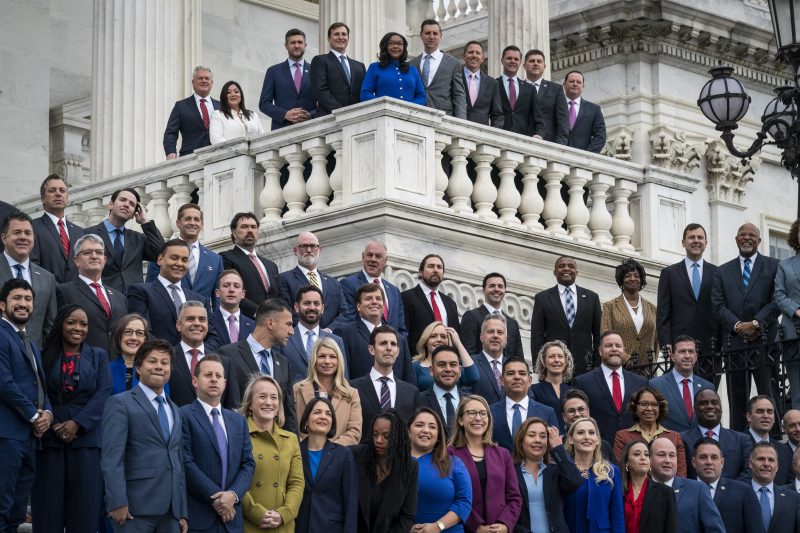In between new member orientation meetings late last year, incoming Rep. Nikki Budzinski (D-Ill.) met with Rep. Mary E. Miller (R-Ill.) to seek common ground on issues affecting their neighboring districts.
Their differences could not be more stark.
Budzinski hails from a swing district and identifies herself as a pragmatic Democrat willing to work across the aisle. Miller has Freedom Caucus bona fides and her constituents elected her over a moderate incumbent in a staunchly conservative district. Yet their meeting forged an understanding, Budzinski said, that they could work together shaping the must-pass reauthorization of the Farm Bill.
A few weeks later, Miller stood 11 times over three days to block Kevin McCarthy (R-Calif.) from becoming speaker of the House, delaying the start of the 118th Congress, before eventually supporting him. The painful path to electing a speaker rattled new lawmakers, with Budzinski recognizing that finding common ground with Miller and other Republicans could make negotiating more challenging — but not impossible.
“I do think that first week is very concerning as far as it relates to governance and what the future might hold in the House,” she said. “But I really just generally believe you got to cook with what’s in the kitchen.”
Roughly 30 new lawmakers, who either flipped seats or won in competitive districts, descended on Washington last month after winning in a midterm election cycle that saw voters largely reject the extremes of both parties. Though these members have different viewpoints on how to make Congress function, they campaigned on finding common solutions that address the concerns often voiced in a more measured way by swing-district voters.
But these new members are now bracing for the possibility that hopes of fulfilling their campaign promises could be dashed if the GOP’s fractured ranks thwart the party’s desire to govern.
The freshman Democrats and Republicans who spoke to The Washington Post see an opportunity to bridge the divide, given that they all believe voters gave Republicans a narrow majority in hopes that the parties will work together. Republicans can afford to lose only four votes to pass anything through their majority, which may require them to lean on Democrats this year to approve must-pass legislation that funds the government and raises the debt ceiling.
“If I had a message from voters that could summarize the November elections, it is: ‘We don’t want you to go to Washington and be a part of the political noise. You need to be a part of the solution and fixing the problem,’” Budzinski said. “I see it as an opportunity for us to work together — finally.”
The reality of narrow margins has made it difficult for Republicans to pass more conservative priorities that aren’t supported by the full conference. Those divisions have scuttled or delayed votes on numerous issues, including border security reform. And Democrats have crossed the aisle on only a few votes, not to help Republicans, but rather to counter common GOP attacks. Over 100 Democrats voted on a resolution denouncing socialism, for example, while almost 150 voted in support of establishing a select committee to investigate China.
Unlike new lawmakers in the 117th Congress, when an insurrection at the Capitol and an ongoing pandemic prevented freshmen from forging early relationships, members of this year’s class have been able to get to know each other through a series of meetings and orientations. And unlike lawmakers who have served in Congress for decades and witnessed politically toxic issues preventing bipartisan compromise, these new members still have the curiosity and willingness to prove naysayers wrong.
And these freshman lawmakers share a belief that differs from that on the fringes within their ranks: that tackling issues using a pragmatic approach — rather than seeking unattainable bigger goals that couldn’t pass a divided Congress — should be the priority.
“It’s like the game of football,” said Rep. Jared Moskowitz (D-Fla.). “You don’t always throw a Hail Mary. You don’t always throw the ball on the ends of 5 yards, 10 yards, 15 yards. And so if that’s what we got to do incrementally to make progress, then so be it.”
Sitting in the chamber after 15 rounds of votes for speaker that felt like “democracy had been hijacked by a handful of extremists,” Rep. Hillary J. Scholten (D-Mich.) was left “wondering what in the world we had gotten ourselves into with this Congress.” But then she found herself clapping alongside Republicans when McCarthy promised that a GOP majority was committed “to stop wasteful Washington spending” while lowering the price of groceries, gas and housing for families. It’s a similar message to what Scholten ran on in a district where she beat a Trump-endorsed Republican and became the first Democrat in decades to represent her part of western Michigan.
“I campaigned a lot on fiscal responsibility,” she said in an interview. “At the center of fiscal responsibility is making sure that we are keeping our government running. I am looking for no-nonsense partners on the other side, and within my own caucus as well, who are not going to play games with the budget and our deficit.”
Rep. Michael Lawler (R), who won a New York district that voted overwhelmingly for President Biden in 2020, said the exercise to elect McCarthy as speaker forced Republicans to address their differences and learn how to “ultimately get the result that we wanted.” He added that Democrats shouldn’t fret that their first week on the Hill will determine the pace of the next two years, noting that the pains of governing also plagued a Democratic majority when the caucus tried to pass priority legislation with its narrow five-vote margin. It did not, however, prevent bipartisan bills such as infrastructure and semiconductor manufacturing legislation from being signed into law.
“I think, as we move forward, you focus on what’s in front of you and not what’s behind you. So if folks on the Democratic side are sincere in wanting to work together, then that’s not going to be an impediment to that,” he said.
Bipartisan-minded Republicans who have served several terms in the House, like Reps. Don Bacon (Neb.), Brian Fitzpatrick (Pa.) and David Joyce (Ohio), have acknowledged the need to lean on their cross-aisle relationships in a similar manner to Democrats when they had a razor-thin majority. When she was speaker, Nancy Pelosi (D-Calif.) faced backlash from her liberal flank on police funding and defense spending policies, among other issues, when Republicans were willing to cross the aisle to support Democratic-led legislation. One Republican familiar with McCarthy’s thinking, who spoke on the condition of anonymity to detail internal discussions, said the speaker is similarly deploying some in his conference to serve as beneficial liaisons to Democrats when votes get tight.
Rep. Jen A. Kiggans (R), who flipped a district in Virginia, said she has sensed that her class of fellow freshmen seems to be “full of a lot of common sense” lawmakers who are focused on working together.
“Nobody likes the screaming and yelling,” she said. “We have to believe that we each have our individual areas of concern that we feel passionately about and acknowledge and listen to those opinions of others, but then work on that compromise.”
The mandate from the election has also inspired a handful of new Republicans to reach out to Democrats, as they recognize the difficulties of governing with a narrow majority. Six Republicans won in Democratic-leaning or swing districts in predominantly liberal New York as candidates campaigned on GOP solutions to rising prices and crime, as well as crossing the aisle if need be.
“I think the American people are looking for adults,” Lawler said. “They’re looking for people who are willing to focus on the facts and the evidence and make decisions that are in the best interest of the country.”
But these Republicans’ chances of reelection are difficult in 2024; GOP strategists admit that a presidential election will reignite Democratic turnout after Republican advantages in the midterms. Though House Republicans largely acknowledge that the majority runs through these 2022 gains, the far-right wing of the conference could make it difficult for more pragmatic conservatives and moderates to hold on to their seats if they force tough votes or stall the majority from governing.
“My sense is that despite the fact that there is a group of Republican members of Congress that are absolutely focused on the kind of chaos and extremism that voters are rejecting, the vast majority of members are interested in getting things done,” Rep. Greg Landsman (D-Ohio) said of conversations he’s had. “Most members want to distance themselves as quickly and as significantly as possible from them.”
Democrats in swing districts also recognize that they must make inroads in ideological communities that may not share their point of view while reassuring their base that they are not abandoning their principles by doing so. Rep. Gabe Vasquez (D), who recently flipped a New Mexico district, said he will stress to his supporters that “compromise is necessary for Congress to function.”
Kiggans said the first step is finding commonalities in each other’s lived experiences, like hers as a member of the Navy and a geriatric nurse. It sounds like an obvious relationship building exercise, but lawmakers who have served in both chambers have lamented that the erosion of basic relationship development has contributed to the rise in partisanship plaguing Congress.
In an effort to find those similarities, Landsman and Moskowitz have separately held several lunches in their first month on Capitol Hill with similarly minded Republicans looking to find common ground. Landsman has expressed wanting to join the GOP in crafting legislation that gives more federal dollars to local police and fire departments to aid lagging recruitment, as well as appropriating more for mental health services as another public safety solution.
Budzinski, the Illinois Democrat, has made plans with Rep. Zachary Nunn (R-Iowa) to visit each other’s state fairs this year.
“Getting to know the new Members on both sides of the aisle, there are a lot of things we all agree on. I believe the freshman class has the ability to bring everyone to the table to achieve these bipartisan results,” Nunn said in a statement.
Lawler said it’s possible for both parties to find a compromise on stemming the flow of fentanyl into the United States, which is killing people in communities across the country. He also said lowering state and local taxes is a priority for him, an issue moderate Democrats had hoped to achieve during the last Congress.
Democrats are keeping an open mind about what legislation to tackle with Republicans, knowing that the GOP sets the tone for which bills to pursue on the floor. Democratic leaders have repeatedly said that their caucus will not support legislation proposed by far-right Republicans or policies that are too extreme, like a border security bill by Rep. Chip Roy (R-Tex.) that detractors say would end all asylum claims.
Scholten has spoken with Republicans about immigration reforms and how best to close supply chains so the United States can remain competitive globally without relying on foreign workers to do so. She and Moskowitz both voted in support of establishing a select committee on China, crossing the aisle for the first time with 144 other Democrats.
In a sign of solidarity, Scholten and freshman Republican Rep. John James (Mich.) decided to sit together during their first State of the Union address to “demonstrate the spirit of bipartisanship” that has already helped them begin finding compromise on clean water legislation and to protect a fighter mission at a local Air National Guard base.
“I think it’s so important, especially in these troubling and trying times, to show that even as neighbors right here in the office and states-mates, that more unites us than divides us,” James said.
“We’re ready to get to work,” Scholten said before they high-fived.
A previous version of this article incorrectly stated which branch of the military Rep. Jen A. Kiggans (R-Va.) served in. She was a Navy pilot. The article has been updated.








